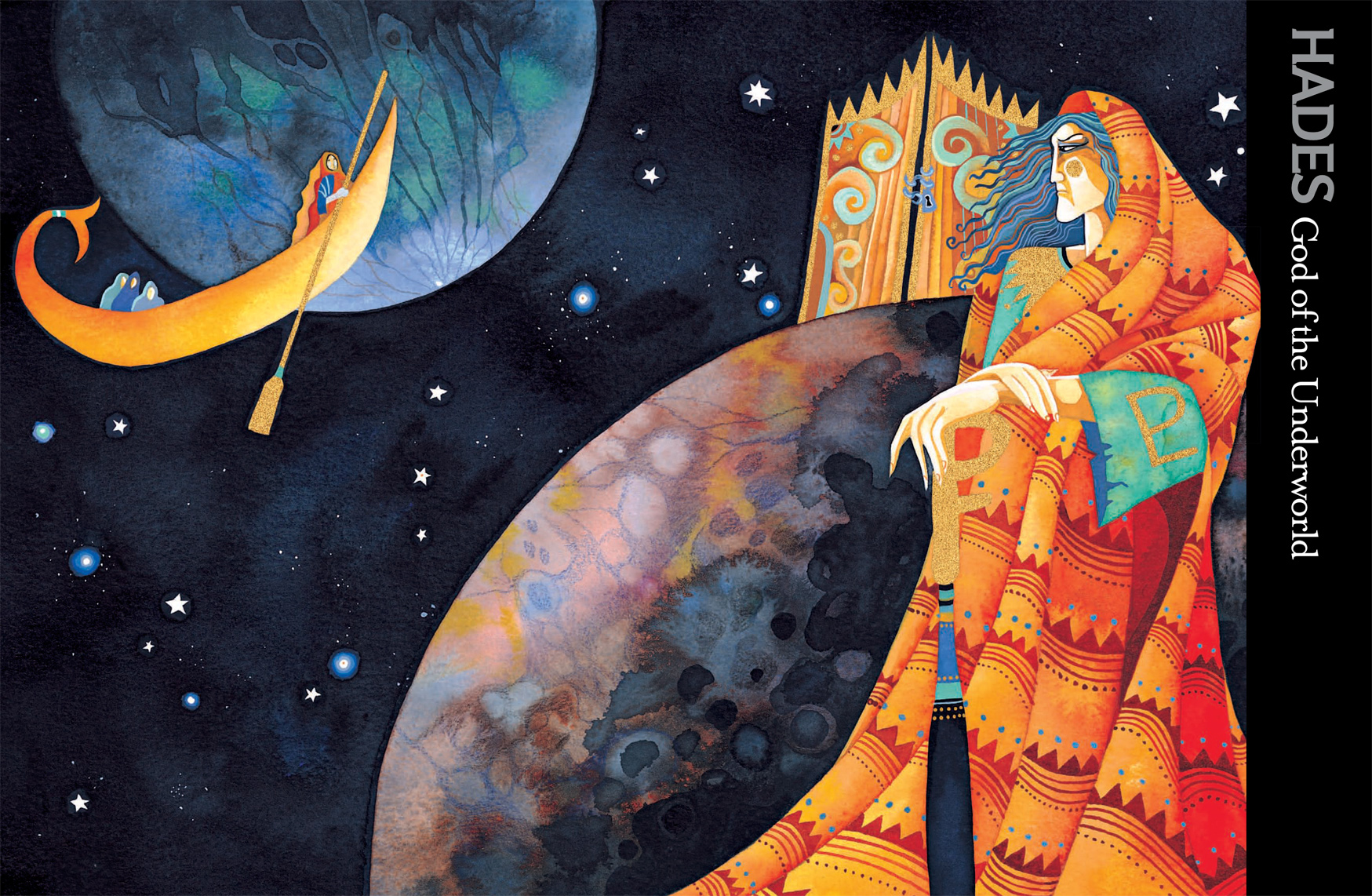


One image had engraved itself in the mind of young, trapped Hades: the gaping hole of his father’s mouth, the yellow of his teeth, the stench of his breath as the huge man swallowed him. From within his father’s belly he punched now and then at the old man’s liver. Remember us, he beat out with his fists, remember your evil act.
When the young gods and goddesses finally spilled out amid the loud groans of their retching father, Hades scrambled to his feet and shook his fists at the rudeness of bright daylight. He’d grown accustomed to the dark, plus he was spitting mad.
So roaring into war beside his siblings felt natural—like butter on a burn—it felt fat and rich and right. He fought like the maddened against his father and the rest of the Titans. And when the Cyclopes joined the battle and presented gifts, Hades didn’t hesitate. He jammed the magic helmet on his head. He flew high, then bombed down like a falcon, straight for the back of Cronus’ neck. He slashed and slashed, flaying the old man’s flesh, always unseen, like in the old days inside the hateful one, but this time effectual. It was Hades who truly overcame the most blame-ridden father of the universe. Hades brought Cronus to his knees; Hades brought Cronus to justice. Wickedness deserves to crawl through the slime.
When Zeus was about to hand out realms, Hades again didn’t wait. He declared the Underworld his. It was the land of darkness, and in all those years of war, Hades had never learned to like daylight. And it was the land of justice. It was where the ruling god sent those gods who fell out of favor with him, the wicked gods. Hades would deal with the wicked. And show no mercy.
After death, mortals wandered the misty gloom of Hades’ House. Only a few terrible sinners were tormented, and even fewer heroes were rewarded. Many other ancient cultures, in contrast, developed strong punishment or reward visions of the afterlife to encourage good behavior in this life. Others proposed reincarnation: After death, the soul moves to a new body—a desirable one if you’d been good, an undesirable one if bad. However, Confucianism, still practiced, says we should be good simply because that’s the right thing to do.

He sat upon an anvil of bronze and fell from the surface of the Earth for nine days and nine nights, until he landed in the Underworld. He could have simply willed himself there. But it pleased him to experience the enormous distance. No one would bother him down here; he was absolute ruler.
The Underworld was huge. Had Hades wanted, he could have fallen another year before landing at the very bottom. But he didn’t. The knowledge of its vastness was enough. He visited Night, one of the earliest powers, draped over his walls, so nicely obscuring. He crossed over Styx, the cold river of hate, the oldest daughter of the Titan Oceanus, who had been given a glorious palace in Tartarus for siding with Zeus in the war against the Titans. He passed by Atlas, the dimwitted son of Iapetus, half brother to the Titans. Atlas had sided with the Titans in the long war, so Zeus doomed him for eternity to bear on the nape of his neck and the girdle of his shoulders the entire weight of the heavens. He passed by the Hesperides, daughters of Night, guarding a tree of golden apples.
This was a fitting realm for him, indeed, especially since now and forever he could keep an eye on that scum-of-a-father Cronus and make sure he never knew freedom again.

The River Styx flows mean and cold, past the aching shoulders of Atlas, while the beautiful Hesperides watch for would-be thieves and the ferryman Charon waits for the newly dead.
With a satisfied sigh, Hades entered his stone palace and looked out on the ghostly and frigid fields, where colorless asphodels bent to a chilling wind. It felt strange to be so alone. He’d have to fix that. Soon.
